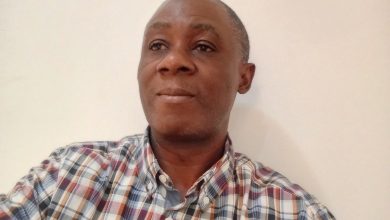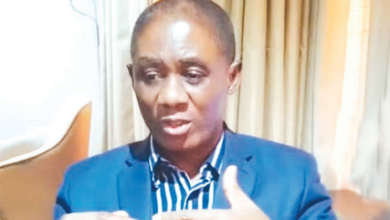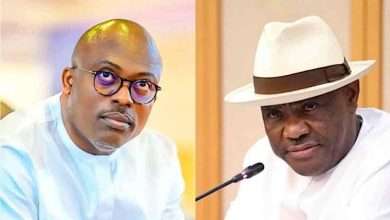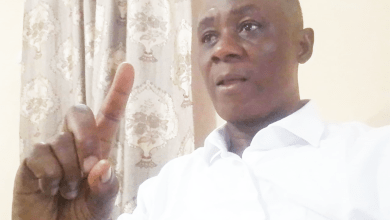FG must treat Ogoni people fairly – Nsuke
Fegalo Nsuke, the president of the Movement for the Survival of Ogoni People (MOSOP) in this interview with Emmanuel Masha, speaks on a wide range of issues affecting the Ogonis. Excerpts:
You have keep raising the alarm over plans by the Federal Government plan to resume oil exploration in Ogoniland through an oil company but some have said that there is no such thing. What are the things that keep confirming your fears over resumption of oil exploration in Ogoniland?
Ogoni is the largest single oil producing ethnic nationality in Nigeria and has about the largest gas deposit in the country. So, if anybody will tells you the government is not interested in Ogoni oil and gas, that person is not realistic. The only reason the Nigerian government under General Sanni Abacha killed Ken Saro-Wiwa was because he questioned the unjust operations of the Nigerian oil industry which destroyed Ogoni and the Niger Delta.
The government has always been interested in the Ogoni oil and all its intervention in Ogoni has unfortunately been targeted at oil resumption and never about the future of the Ogoni people. Some of the conflicts we have had in Ogoni, even in MOSOP, had been because of oil industry infiltrations especially by Shell. One thing that has been clear is that Shell’s divide and conquer tactics to foreclose the Ogoni demands and force the Ogoni people to accept oil resumption without addressing the fundamental issues the people have raised. But what MOSOP wants is a peaceful resolution of the crisis in such a way that the problem would be permanently addressed.
I am sure you are aware of the memo from former Chief of Staff to the President, late Abba Kyari and former Petroleum minister, Ibe Kachikwu, all of which were argeted at getting an endorsement for oil resumption. What about Belema Oil, Robo Michael and the Nigeria National Petroleum Corporation (NNPC) whose dubious moves have threatened the peace of Ogoni? They were all moves to force oil resumption against the wishes of the people.
What is particularly wrong if oil exploration
resumes in Ogoni, considering that
there will be jobs for the unemployed
and other economic activities, and why
is MOSOP opposed to the return of oil
exploration?
There would be nothing wrong with
resumption of oil exploration but conflicts
ensue when there is gross injustice
done to the people. If you have had
the time to glance through the United
Nations Environment Programme
(UNEP) report on Ogoni, it will shock
you, the extent of damage Shell did to
the Ogoni environment and the government
did not sanction them. Conscious
of all of these, the Ogoni people will
resist every attempt to resume oil production
and the government as usual
will only draft soldiers to kill the people
and we do not want that. Our people
should not be killed simply because
Shell and their partners including the
government must make money in an
unfair way.
You should also understand that oil
production itself does not create jobs.
As at December 2018, statistics show
that Shell’s entire operations in Nigeria
employed an estimated 4,000 persons.
So, how many can it employ for the
Ogoni operations? If you employ fitters
and welders today to prepare grounds
for oil resumption, once the pipes are
laid and production commences, the
fitters and welders go home and what
next. Of course the oil is channeled to
Bonny Terminal for export and the
money goes to a federation account
from which Ogoni is not entitled to
any share.
So, oil production does not create
jobs. It is the money that is derived
from oil that is used to create jobs, build
infrastructure and improve the quality
of living for the people and today, there
is nothing coming to Ogoni from the
federation account because of Nigeria’s
discriminatory structure which
Ogoni has become a major victim.
We understand all that and we want
discussions to deal with the issue of
self-determination for the Ogoni people
as well as community participation to
enable the people benefit from their oil
wealth and not just to be left to cope
with the disastrous consequences of
oil production while those who do not
even know the colour of oil are making
big budgets and building large
economies from our own resources.
There has to be some fairness and that
demands that in the circumstance, all
parties must embrace dialogue.
MOSOP has made a proposal to
the government. Our proposal centres
around the decriminalization of the nine
Ogonis killed by the Nigerian state on
November 10, 1995 and respect for the
rights of the Ogoni people to self-determination.
We are waiting to see how the
government responds to all these.
The cult related killings in Ogoni has
reduced drastically. The same thing goes
with the inter-communal clashes that
forced many to flee their homes. How was
peace achieved and what should be done
to sustain it?
The reality is that we have moved
slightly away from elections, which
have been the nucleus of the conflicts.
I maintain that the upsurge in killings
and the so called gang related conflicts
just before elections and the spill over
we saw after the elections
are not accidental. It is a clear signal
to political sponsorship
of violence in the
region.
Secondly, I would
think that the Ogoni
people have become
more aware of the gang
up against them, the
eternal influence that
is fueling the conflicts
and Ogoni youths may
just be resisting these
influences. But we cannot
address these conflicts
while pretending
not to be aware of the
political sponsorship
of gangsterism in the
area.
There is nothing
happening in Ogoni
that is different from
what happens elsewhere
in this country.
But what baffles me is
that there is a government
in place and the
government pretends
that it does not know
the sponsors of the
gang wars. I do not think
that the upsurge in violence during
elections can be coincidental. So, to
end the political violence, which they
prefer to call cult related crises, the government
must investigate the political
elites and deal with those found to be
sponsoring violence.
Our people are ordinarily very
peaceful and not violent. The youths
are mostly jobless and we are predominantly
farmers. So when young people
who do not have jobs can suddenly afford
rifles, then there are lots of questions
begging for answers. To suppress
the gang war, the government and investigators
have to target the sponsors.
The leadership crisis that engulfed
MOSOP for years seems to have been
resolved through the courts. Why was this
matter not resolved among the key stakeholders
as a family affair instead of taking
it to the courts and now that you are on
the saddle of MOSOP leadership, what efforts
are you putting in place to hand over
peacefully when your tenure elapses?
Speaking against Shell comes with
a lot of persecution. What we experienced
was a political attempt to hijack
the leadership of MOSOP. Of course it
was not the first time, in 2016, an Ogoni
king sat in his house and swore-in his
own president of MOSOP which also
created a lot of crises. The interest is oil
and how to appropriate it. But MOSOP
has a constitution and people should
not expect that we will be silent and
watch the desecration of our collective
will represented in the MOSOP Constitution
and the Ogoni Bill of Rights.
We have always defeated them in
the courts because we present the truth
which is that I contested and won the
MOSOP presidency election in December
2018. But when Shell is involved in
a fight, there is always a k-leg. Unfortunately,
some of these things have been
stage managed with the support of the
unethical media.
You were in America some months
ago and met some Ogoni leaders and
stakeholders. You also met the Rev. Jesse
Jackson and a few other black leaders.
What was the real essence of that visit
and did it impact on Ogoni at home?
My visit to the United States was for
a meeting with the U.S State Department.
It was centered on my detention,
the threat to my life, the Ogoni cleanup
and several other issues affecting the
fundamental rights of the Ogoni people
to decent living. That meeting was at
the instance of the Council of Ogoni
Professionals and included the leadership
of MOSOP USA.
I also addressed the Presidency
Meeting of the Unrepresented Nations
and Peoples Organization (UNPO) in
Washington. All these were to highlight
the predicament of the Ogoni people in
Nigeria and the need for global support
to save the Ogoni people from extinction.
Of course, the people now know
that the eyes of the world are on Ogoni
and Nigeria, and how the Ogoni people
are treated is something the world is
interested in.
We want the Nigerian government
to understand that it cannot act so callously,
taking away the wealth of the
most naturally endowed part of Nigeria
and not showing any concern for
the rights of the people even as they are
a distinct ethnic nationality within the
Nigerian federal structure.
There are a number of groups in Ogoni
agitating for a fair deal for Ogoni from the
federal and state governments. The leadership
crisis in MOSOP kind of left a void in
terms of central articulation of demands.
What efforts are you making to meet with
these other groups in order to speak with
one voice for the OGONI?
Speaking for Ogoni these days have
become a profitable business. But
MOSOP has a clear and legitimate obligation
and mandate which is clearly
spelt out in the Ogoni Bill of Rights.
That is to make representations to government
and the international community
and protest the injustices done to
the Ogoni as long as these injustices
continue. Our goal is to work towards
a free and prosperous Ogoni and Nigeria
by extension. No other group or
organization in Ogoni has that mandate
and so they can continue in their
usual business but for MOSOP, we are
focused on delivering on our mandate
no matter the distractions.
MOSOP is not just a group, it is a
massed based movement. It is a philosophy
and all those who believe in
that philosophy, the philosophy that as
a distinct ethnic nationality in Nigeria,
the Ogoni people have a right to function
within Nigeria as Ogoni people
and be treated fairly, are all members
of MOSOP. So, we still do our job of representation
and articulating the position
of the Ogoni people on issues. That
is why I was at the UNPO in March this
year to voice the position of the Ogoni
people at the international stage.
You have consistently called on the Hydrocarbon
Pollution Remediation Project
(HYPREP) to provide potable drinking
water for Ogoni communities as part of the
clean-up exercise. What is the response?
HYPREP has informed us they
already have a water provision plan
which commenced with mapping of
all existing water projects in Ogoni. We
want them to take the issue of water
provision very seriously because our
people are drinking poisonous substances
in the contaminated water. We
will further engage HYPREP to achieve
this goal.
Of course, there can be no remediation
without addressing the water
crises just as we cannot say we have
properly remediated without compensating
the people who lost their sources
of livelihood. Our engagement will be
to resolve all these issues and we hope
it goes well.





